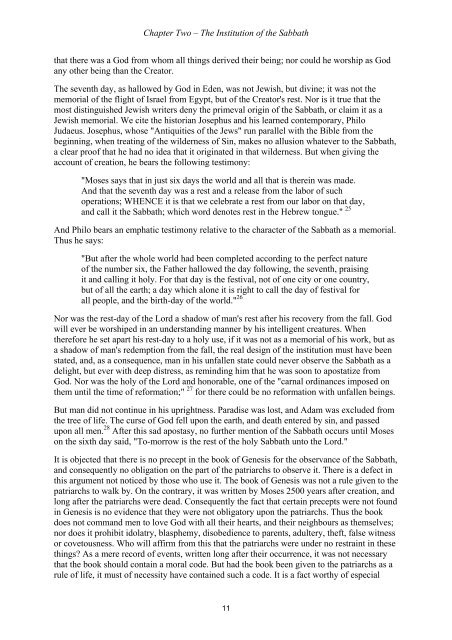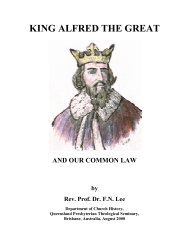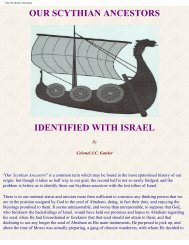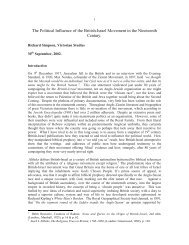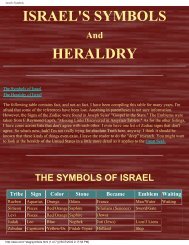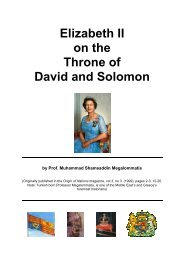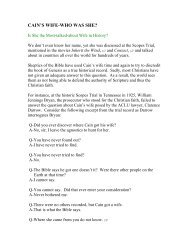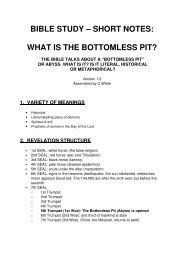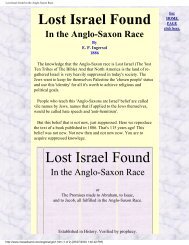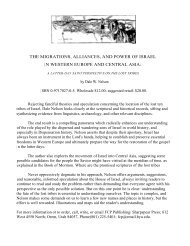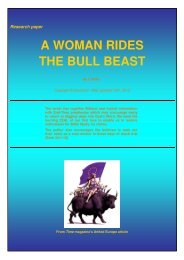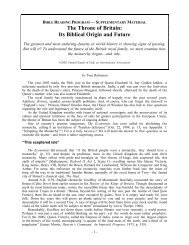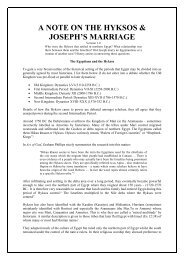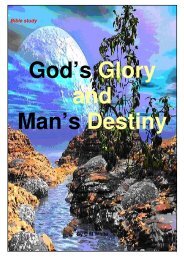HISTORY OF THE SABBATH - Friends of the Sabbath Australia
HISTORY OF THE SABBATH - Friends of the Sabbath Australia
HISTORY OF THE SABBATH - Friends of the Sabbath Australia
Create successful ePaper yourself
Turn your PDF publications into a flip-book with our unique Google optimized e-Paper software.
Chapter Two – The Institution <strong>of</strong> <strong>the</strong> <strong>Sabbath</strong>that <strong>the</strong>re was a God from whom all things derived <strong>the</strong>ir being; nor could he worship as Godany o<strong>the</strong>r being than <strong>the</strong> Creator.The seventh day, as hallowed by God in Eden, was not Jewish, but divine; it was not <strong>the</strong>memorial <strong>of</strong> <strong>the</strong> flight <strong>of</strong> Israel from Egypt, but <strong>of</strong> <strong>the</strong> Creator's rest. Nor is it true that <strong>the</strong>most distinguished Jewish writers deny <strong>the</strong> primeval origin <strong>of</strong> <strong>the</strong> <strong>Sabbath</strong>, or claim it as aJewish memorial. We cite <strong>the</strong> historian Josephus and his learned contemporary, PhiloJudaeus. Josephus, whose "Antiquities <strong>of</strong> <strong>the</strong> Jews" run parallel with <strong>the</strong> Bible from <strong>the</strong>beginning, when treating <strong>of</strong> <strong>the</strong> wilderness <strong>of</strong> Sin, makes no allusion whatever to <strong>the</strong> <strong>Sabbath</strong>,a clear pro<strong>of</strong> that he had no idea that it originated in that wilderness. But when giving <strong>the</strong>account <strong>of</strong> creation, he bears <strong>the</strong> following testimony:"Moses says that in just six days <strong>the</strong> world and all that is <strong>the</strong>rein was made.And that <strong>the</strong> seventh day was a rest and a release from <strong>the</strong> labor <strong>of</strong> suchoperations; WHENCE it is that we celebrate a rest from our labor on that day,and call it <strong>the</strong> <strong>Sabbath</strong>; which word denotes rest in <strong>the</strong> Hebrew tongue." 25And Philo bears an emphatic testimony relative to <strong>the</strong> character <strong>of</strong> <strong>the</strong> <strong>Sabbath</strong> as a memorial.Thus he says:"But after <strong>the</strong> whole world had been completed according to <strong>the</strong> perfect nature<strong>of</strong> <strong>the</strong> number six, <strong>the</strong> Fa<strong>the</strong>r hallowed <strong>the</strong> day following, <strong>the</strong> seventh, praisingit and calling it holy. For that day is <strong>the</strong> festival, not <strong>of</strong> one city or one country,but <strong>of</strong> all <strong>the</strong> earth; a day which alone it is right to call <strong>the</strong> day <strong>of</strong> festival forall people, and <strong>the</strong> birth-day <strong>of</strong> <strong>the</strong> world." 26Nor was <strong>the</strong> rest-day <strong>of</strong> <strong>the</strong> Lord a shadow <strong>of</strong> man's rest after his recovery from <strong>the</strong> fall. Godwill ever be worshiped in an understanding manner by his intelligent creatures. When<strong>the</strong>refore he set apart his rest-day to a holy use, if it was not as a memorial <strong>of</strong> his work, but asa shadow <strong>of</strong> man's redemption from <strong>the</strong> fall, <strong>the</strong> real design <strong>of</strong> <strong>the</strong> institution must have beenstated, and, as a consequence, man in his unfallen state could never observe <strong>the</strong> <strong>Sabbath</strong> as adelight, but ever with deep distress, as reminding him that he was soon to apostatize fromGod. Nor was <strong>the</strong> holy <strong>of</strong> <strong>the</strong> Lord and honorable, one <strong>of</strong> <strong>the</strong> "carnal ordinances imposed on<strong>the</strong>m until <strong>the</strong> time <strong>of</strong> reformation;" 27 for <strong>the</strong>re could be no reformation with unfallen beings.But man did not continue in his uprightness. Paradise was lost, and Adam was excluded from<strong>the</strong> tree <strong>of</strong> life. The curse <strong>of</strong> God fell upon <strong>the</strong> earth, and death entered by sin, and passedupon all men. 28 After this sad apostasy, no fur<strong>the</strong>r mention <strong>of</strong> <strong>the</strong> <strong>Sabbath</strong> occurs until Moseson <strong>the</strong> sixth day said, "To-morrow is <strong>the</strong> rest <strong>of</strong> <strong>the</strong> holy <strong>Sabbath</strong> unto <strong>the</strong> Lord."It is objected that <strong>the</strong>re is no precept in <strong>the</strong> book <strong>of</strong> Genesis for <strong>the</strong> observance <strong>of</strong> <strong>the</strong> <strong>Sabbath</strong>,and consequently no obligation on <strong>the</strong> part <strong>of</strong> <strong>the</strong> patriarchs to observe it. There is a defect inthis argument not noticed by those who use it. The book <strong>of</strong> Genesis was not a rule given to <strong>the</strong>patriarchs to walk by. On <strong>the</strong> contrary, it was written by Moses 2500 years after creation, andlong after <strong>the</strong> patriarchs were dead. Consequently <strong>the</strong> fact that certain precepts were not foundin Genesis is no evidence that <strong>the</strong>y were not obligatory upon <strong>the</strong> patriarchs. Thus <strong>the</strong> bookdoes not command men to love God with all <strong>the</strong>ir hearts, and <strong>the</strong>ir neighbours as <strong>the</strong>mselves;nor does it prohibit idolatry, blasphemy, disobedience to parents, adultery, <strong>the</strong>ft, false witnessor covetousness. Who will affirm from this that <strong>the</strong> patriarchs were under no restraint in <strong>the</strong>sethings? As a mere record <strong>of</strong> events, written long after <strong>the</strong>ir occurrence, it was not necessarythat <strong>the</strong> book should contain a moral code. But had <strong>the</strong> book been given to <strong>the</strong> patriarchs as arule <strong>of</strong> life, it must <strong>of</strong> necessity have contained such a code. It is a fact worthy <strong>of</strong> especial11


